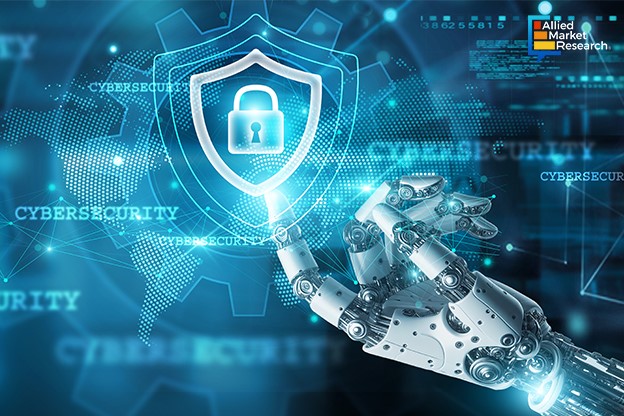AI in Cybersecurity: How Is This Technology Enhancing Cyber Defense across Modern Businesses?

24 Dec
2024
Highlights:
- The growing importance of AI in cybersecurity
- Notable applications of AI in the cybersecurity sector
- AI and human cybersecurity experts
- Promising developments in the domain
In the last few years, AI has revolutionized the way IT security professionals conceptualize cybersecurity. Nowadays, AI-powered cybersecurity tools now help improve data protection by quickly identifying patterns, detecting unusual activity, and automating tasks.
The benefits of automating AI in cybersecurity for digital-age organizations
Integrating AI with cybersecurity offers several significant benefits such as facilitating faster data collection and thereby making incident management more dynamic and efficient. This automation reduces the need for security professionals to engage in manual, time-consuming tasks, allowing them to concentrate on strategic activities that provide greater value to the business.
On the other hand, traditional security measures often rely on human intervention, which leads to big errors. However, by automating processes with AI, organizations eliminate the human element from many security tasks. It enhances efficiency and redirects personnel into other important areas where their skills are most needed.
Furthermore, automating cybersecurity functions enables organizations to identify and rectify potential weaknesses in their security strategies. This leads to the establishment of formalized procedures that contribute to creating a more secure IT environment. In addition, AI systems analyze vast amounts of data in real-time, identifying patterns and anomalies that signal potential security breaches. This capability allows for quicker responses to threats and minimizes the window of opportunity for attackers. Also, AI-driven solutions easily adapt to handle increasing volumes of data and a growing number of connected devices, ensuring robust security measures in expanding digital infrastructures.
Moreover, as AI learns from new data and past incidents, this feature enables it to detect and respond to evolving threats over time. This adaptability ensures that security measures remain effective against emerging cyber risks. In addition, the technology automates response workflows in the event of a cyber incident, enabling rapid and coordinated actions that reduce the impact of threats. Due to these reasons, the AI in cybersecurity industry has experienced remarkable growth in the last few years.
Promising use cases of AI in cybersecurity
AI in cybersecurity enhances password protection and user account security through advanced authentication methods. Websites commonly require users to log in for purchases or sensitive data entry, necessitating additional security layers to safeguard information from malicious actors. AI tools like CAPTCHA, facial recognition, and fingerprint scanners help organizations verify legitimate login attempts, effectively thwarting cybercrime tactics such as brute-force attacks and credential stuffing that threaten network integrity.
On the other hand, Phishing remains a significant cybersecurity threat to businesses across various sectors. AI enhances email security by detecting anomalies and indicators of malicious messages. It analyzes email content and context to differentiate between spam, phishing attempts, and legitimate communications. For instance, AI swiftly identifies phishing signs like email spoofing and misspelled domains. Machine learning algorithms enable AI to learn from data, improving accuracy in recognizing advanced threats such as spear phishing, thereby intercepting suspicious activities before they harm corporate networks.
The role of AI in transforming cybersecurity expertise
AI has the potential to enhance the skills of human cybersecurity experts. Although automation leads to some job displacement by reducing the need for certain manual tasks, the unique insights and critical thinking of human professionals remain irreplaceable. A balanced approach that integrates AI with human expertise allows organizations to leverage the strengths of both resources effectively. This synergy enhances overall cybersecurity efforts, enabling teams to focus on strategic initiatives while this modern technology handles routine tasks and threat detection.
Accenture introduced new Gen AI-powered cybersecurity services to combat rising threats
In November 2024, Accenture, a global multinational professional services company announced the launch of new services and capabilities designed to reinvent business and cyber resilience through the power of Gen AI. The company offers deepfake protection and quantum-safe data security solutions to help clients across industries become cyber-resilient organizations. These days cybercriminals are increasingly using Gen AI and dark large language models to launch new types of cyberattacks. Accenture’s cyber intelligence researchers have observed a significant rise in deepfake-related tool trading on dark web forums in the first quarter of 2024, compared to that in 2023. With this launch, the company aims to warn organizations about the rise in AI-driven cyberattacks and guide them to adopt advanced AI-based cybersecurity measures that detect, predict, respond to, and prevent threats in real-time.
G42 strengthened its cybersecurity portfolio with the CPX acquisition
In October 2024, G42, an Abu Dhabi-based AI and cloud computing company acquired CPX, a renowned cybersecurity solution provider to integrate cybersecurity capabilities across the AI value chain. With this acquisition, G42 aims to address the evolving cybersecurity challenges by integrating CPX’s deep expertise and talent, ensuring comprehensive protection for its clients and its own AI-driven platforms and services. Moreover, CPX employs over 400 specialists who serve enterprises, and governments, and a full range of cybersecurity capabilities, ensuring organizations safeguard their digital assets to remain compliant with rapidly evolving regulatory standards.
The crux
Artificial intelligence has reshaped the landscape of cybersecurity by enabling faster detection, automating responses, and improving risk management strategies. Moreover, the rise in the adoption of digitalization in security solutions is expected to increase the demand for real-time threat detection systems in the coming years.
To acquire more knowledge about the upcoming applications of the AI in cybersecurity landscape, feel free to talk to our industry specialists today!

Rosy Behera
Author's Bio- Rosy Behera holds a bachelor’s degree in Electrical and Electronics Engineering and now she is a content writer by profession. She loves to portray her thoughts and ideas with a nice command of words. Grabbing an audience with her creative write-ups is one of her biggest assets so far. Apart from writing, she is a certified “Odisi” dancer and has done Gardharva in Drawing, Painting, and Arts. She always explores new things through travel and is a big foodie.
Avenue: Entire Library membership of Allied Market Research Reports at your disposal
- Avenue is an innovative subscription-based online report database.
- Avail an online access to the entire library of syndicated reports on more than 2,000 niche industries and company profiles on more than 12,000 firms across 11 domains.
- A cost-effective model tailored for entrepreneurs, investors, and students & researchers at universities.
- Request customizations, suggest new reports, and avail analyst support as per your requirements.
- Get an access to the library of reports at any time from any device and anywhere.
Related Post
-
How are Submarine Cables Transforming Global Connectivity with Enhanced User Experience?
-
Endoscopy Procedures: Transformations in Techniques and Applications
-
AI-Powered Video Analytics: How the Product Actually Works for enterprises
-
Painting Robots: Transforming Precision Coating and Creative Applications
-
Innovations in Pharmacovigilance Systems Advancing Patient Safety
-
Understanding Edge Security: Keeping Data Safe Near the Source
-
Exploring the Use and Advancements of 3D Laser Scanners in Professional Applications
-
Reinforcing Industrial Controls with Smarter Tools and Training








